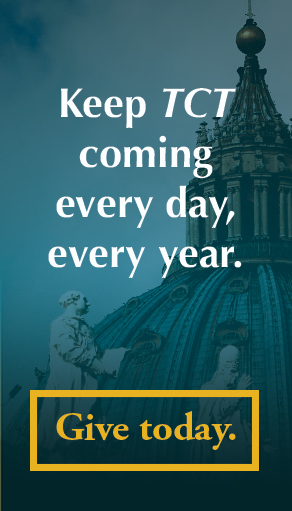Here is a puzzle. Very often if not each day, Catholics pray the Lord’s Prayer, which includes the petition, “Give us this day our daily bread.” In the Douay-Rheims translation, this line is translated (perhaps more accurately) as “Give us this day our supersubstantial bread.” As the Catechism teaches, the petition refers directly to “the Bread of Life, the Body of Christ.”
On this point, the Catechism quotes St. Augustine:
The Eucharist is our daily bread,” and St. Peter Chrysologus, “The Father in heaven urges us, as children of heaven, to ask for the bread of heaven. [Christ] himself is the bread who, sown in the Virgin, raised up in the flesh, kneaded in the Passion, baked in the oven of the tomb, reserved in churches, brought to altars, furnishes the faithful each day with food from heaven.
But then here is the puzzle. Why is it that those who pray this prayer do not, as a rule, make an effort to attend daily Mass and receive the Eucharist each day? They ask for daily supersubstantial bread, and it is there to receive, but they do not receive it.
To me, this question is much more difficult than whether God can work miracles to answer prayers. Of course, the God who created the universe out of nothing can create any particular thing at any time to work a miracle. Of course, as a spiritual being, he has control over mere matter, as even an angel does.
And the problem is more difficult, too, than the general question of whether God changes the world precisely in answer to prayers – because, if prayers are efficacious at all, shouldn’t they be most efficacious over the person who is praying them?
One might say the prayer has been answered by the churches built in our neighborhoods and the vocations of the priests who offer Mass there and the donations of parishioners to support those parishes. God has indeed given us our daily bread, most abundantly (at least, he has done so in the past). He has upheld his end of the bargain, so to speak.
The problem is that we don’t take it. And why would one expect God to answer that prayer? Only a fool would pray, “God, bring me my cup of coffee,” and complain if it were not answered.
My puzzle then becomes: why haven’t we been changed by praying the Lord’s Prayer so that we act on the desire for daily bread that we articulate?

Part of the problem, surely, is that we do not understand vocal prayer aright. We think of vocal prayer as artificial because it is not a spontaneous and “sincere” expression of what we naturally think. (On this error, recall that Rousseau’s Nouvelle Héloïse was placed on the index of prohibited books.).
Or we suppose that vocal prayer’s main use is to solve a coordination problem: when many of us are together, the only way we can pray the same thing is by following a set text.
Or we imagine that the recital of a vocal prayer is a ritual, some kind of sacramental, which confers grace through its mere performance.
Another problem is that for most Catholics their intention in that petition never reaches through to what the Catechism calls its “direct reference.” They suppose that “daily bread” refers to the necessary means of life, solely. They view the petition as a humble admission of our reliance on God and also as an implicit commitment to keep our needs modest.
It is that, of course, but it is infinitely more. As Pius XI taught in his famous 1905 “Decree on Frequent and Daily Reception of Holy Communion”: “we are bidden in the Lord’s Prayer to ask for ‘our daily bread’ by which words, the holy Fathers of the Church all but unanimously teach, must be understood not so much that material bread which is the support of the body as the Eucharistic bread which ought to be our daily food.”
These problems are related, as we can see, if we attend to a remarkable expression that St. Thomas uses when he expounds the Lord’s Prayer in the Summa Theologiae. A vocal prayer, he says, is an “interpreter” of our desires before God. An interpreter (Latin, interpres) is a middleman, a mediator, a broker, a negotiator. St. Theresa of Avila likened prayer to approaching a great king.
Wouldn’t it be to our advantage, if we were granted an audience with royalty, to be introduced and presented by someone from the court, who could articulate rightly to the king, and in due language, the reason for our visit? And then, if this mediator was adept, wouldn’t we correct and adjust our intentions, to match precisely what he said? The Lord’s Prayer is like that.
It follows, St. Thomas says, that “in the Lord’s Prayer not only do we ask for all that we may rightly desire, but also in the order wherein we ought to desire them, so that this prayer not only teaches us to ask, but also directs all our affections.”
Consider an application for today, the intention, “Hallowed be thy name.” Maybe you are angry at the L.A. Dodgers for re-inviting the Sisters of Perpetual Indulgence, not unreasonably, since it seems an elementary principle of civility not to honor those dedicated to mocking any religion.
And yet, now that you have heard of this group of sad and sacrilegious men, will you forget them tomorrow, or will you continue to pray for them under that intention? Their sacrilege remains, whether the Dodgers honor them or not. The Lord’s Prayer as “interpreter” instructs us to do so – and then, to “forgive those who trespass against us.”
Another reason to look forward to Pentecost: “We do not know how to pray as we should, but the Spirit Himself intercedes for us with groanings too deep for words.” (Romans 8:26).

















